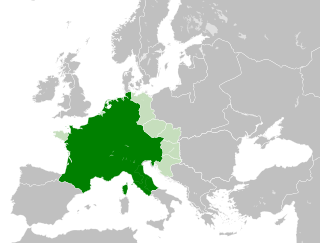
Alcuin of York – also called Ealhwine, Alhwin, or Alchoin – was a scholar, clergyman, poet, and teacher from York, Northumbria. He was born around 735 and became the student of Archbishop Ecgbert at York. At the invitation of Charlemagne, he became a leading scholar and teacher at the Carolingian court, where he remained a figure in the 780s and 790s. Before that, he was also a court chancellor in Aachen. "The most learned man anywhere to be found", according to Einhard's Life of Charlemagne, he is considered among the most important intellectual architects of the Carolingian Renaissance. Among his pupils were many of the dominant intellectuals of the Carolingian era.
Angilbert, Count of Ponthieu was a noble Frankish poet who was educated under Alcuin and served Charlemagne as a secretary, diplomat, and son-in-law. He is venerated as a pre-Congregation saint and is still honored on the day of his death, 18 February.

The Carolingian Empire (800–887) was a Frankish-dominated empire in western and central Europe during the Early Middle Ages. It was ruled by the Carolingian dynasty, which had ruled as kings of the Franks since 751 and as kings of the Lombards in Italy from 774. In 800, the Frankish king Charlemagne was crowned emperor in Rome by Pope Leo III in an effort to transfer the Roman Empire from the Byzantine Empire to Western Europe. The Carolingian Empire is sometimes considered the first phase in the history of the Holy Roman Empire.

The Carolingian dynasty was a Frankish noble family named after Charles Martel and his grandson Charlemagne, descendants of the Arnulfing and Pippinid clans of the 7th century AD. The dynasty consolidated its power in the 8th century, eventually making the offices of mayor of the palace and dux et princeps Francorum hereditary, and becoming the de facto rulers of the Franks as the real powers behind the Merovingian throne. In 751 the Merovingian dynasty which had ruled the Franks was overthrown with the consent of the Papacy and the aristocracy, and Pepin the Short, son of Martel, was crowned King of the Franks. The Carolingian dynasty reached its peak in 800 with the crowning of Charlemagne as the first Emperor of the Romans in the West in over three centuries. Nearly every monarch of France from Charlemagne's son Louis the Pious till the penultimate monarch of France Louis Philippe have been his descendants. His death in 814 began an extended period of fragmentation of the Carolingian Empire and decline that would eventually lead to the evolution of the Kingdom of France and the Holy Roman Empire.

Encomium is a Latin word deriving from the Ancient Greek enkomion (ἐγκώμιον), meaning "the praise of a person or thing." Another Latin equivalent is laudatio, a speech in praise of someone or something.

Pepin or Pippin was King of Italy from 781 until his death in 810. Born Carloman, he was the third son of Charlemagne. Carloman was renamed Pepin upon his baptism in 781, where he was also crowned as king of the Lombard Kingdom his father had conquered. Pepin ruled the kingdom from a young age under Charlemagne, but predeceased his father. His son Bernard was named king of Italy after him, and his descendants were the longest-surviving direct male line of the Carolingian dynasty.

Pepin the Short, was King of the Franks from 751 until his death in 768. He was the first Carolingian to become king.
Ermoldus Nigellus, or Niger—translated Ermold the Black, or Ermoald, was a poet who lived at the court of Pippin of Aquitaine, son of Frankish Emperor Louis I, and accompanied him on a campaign into Brittany in 824. Ermoldus was a cultured man with a knowledge of the Latin poets, and his poem, In honorem Hludovici imperatoris, has some historical value. It consists of four books and deals with the life and exploits of Louis from 781 to 826. He also wrote two poems in imitation of Ovid, which were addressed to Pippin.

Saint Paulinus II was a priest, theologian, poet, and one of the most eminent scholars of the Carolingian Renaissance. From 787 to his death, he was the Patriarch of Aquileia. He participated in a number of synods which opposed Spanish Adoptionism and promoted both reforms and the adoption of the Filioque into the Nicene Creed. In addition, Paulinus arranged for the peaceful Christianisation of the Avars and the alpine Slavs in the territory of the Aquileian patriarchate. For this, he is also known as the apostle of the Slovenes.
Pepin, or Pippin the Hunchback was a Frankish prince. He was the eldest son of Charlemagne and noblewoman Himiltrude. He developed a humped back after birth, leading early medieval historians to give him the epithet "hunchback". He lived with his father's court after Charlemagne dismissed his mother and took another wife, Hildegard. Around 781, Pepin's half brother Carloman was rechristened as "Pepin of Italy"—a step that may have signaled Charlemagne's decision to disinherit the elder Pepin, for a variety of possible reasons. In 792, Pepin the Hunchback revolted against his father with a group of leading Frankish nobles, but the plot was discovered and put down before the conspiracy could put it into action. Charlemagne commuted Pepin's death sentence, having him tonsured and exiled to the monastery of Prüm instead. Since his death in 811, Pepin has been the subject of numerous works of historical fiction.
The anonymous Saxon poet known as Poeta Saxo, who composed the medieval Latin Annales de gestis Caroli magni imperatoris libri quinque was probably a monk of Saint Gall or possibly Corvey. His Annales is one of the earliest poetic treatments of annalistic material and one of the earliest historical works to concentrate on Saxony. It is considered characteristic of the dénouement of the Carolingian Renaissance.
Hibernicus exul was an anonymous Irish Latin poet, grammarian, and dialectician. His works include a comic mock epic, a panegyric to Charlemagne, epigrams of advice to young scholars and a poetic overview of the seven liberal arts.
The Versus de Verona, also Carmen Pipinianum or Rhythmus Pipinianus, was a medieval Latin poetic encomium on the city of Verona, composed during the Carolingian Renaissance, between 795 and 806. It was modeled on the Laudes Mediolanensis civitatis (c.738), which is preserved today only in a Veronese manuscript. The anonymous Versus have been ascribed to Pacificus, archdeacon at Verona from 803 until his death in 846, but this ascription is unlikely. The poem consists of thirty-three strophes and three verses.
The Planctus (de obitu) Karoli, also known by its incipit A solis ortu, is an anonymous medieval Latin planctus eulogising Charlemagne, written in accented verse by a monk of Bobbio shortly after his subject's death in 814. It is generally considered the earliest surviving planctus, though its melody is written in tenth-century neumes, one of the earliest surviving examples of this sort of musical notation. The poem has been translated into English by Peter Godman.
Moduin, Modoin, or Mautwin was a Frankish churchman and Latin poet of the Carolingian Renaissance. He was a close friend of Theodulf of Orléans, a contemporary and courtier of the emperors Charlemagne and Louis the Pious, and a member of the Palatine Academy. In signing his own poems he used the pen name Naso in reference to the cognomen of Ovid. From 815 until his death he was the Bishop of Autun.
Angelbert was a Frankish soldier and poet, possibly from Aquitaine. His "Verses on the Battle that was Fought at Fontenoy" are a first-hand description of the Battle of Fontenoy of 25 June 841, in which he participated with the army of Lothair I. They are an important piece of battle literature from the twilight of the Carolingian Renaissance. Historian Bernard Bachrach has examined them as a source for the emotional effects of battle during the ninth century.
Gerold was a franconian nobleman who served the Frankish King, Charlemagne, as Margrave of the Avar March and Prefect of Bavaria in what is now South-Eastern Germany. Gerold played a significant role in the integration of Bavaria into the Frankish Kingdom during Carolingian expansion in the late 8th, and early 9th centuries. Gerold both aided the continuity of Agilofing rule of Bavaria, as well as took steps to integrate Bavarians into the wider scope of the Frankish Kingdom. Gerold was related both to the Agilofing family, the ruling class of Bavaria, as well as the Carolingian family. The Agilofings had ruled Bavaria since Duke Garibald I in 548. Gerold was born into the Agilofings, and his sister Hildegard was married to Charlemagne in 771. From these familial connections, he was appointed Prefect of Bavaria following the deposition of Duke Tassilo III in 788. Gerold was heralded as a superb military commander, giving rise to his promotion to Prefect as a defender of the eastern border of the Frankish Kingdom. In 799, Gerold is said to have fallen in battle against the Avars, shortly after the same Avars killed his ally, Eric, Duke of Friuli, through treachery.

The Karolus magnus et Leo papa, sometimes called the Paderborn Epic or the Aachen Epic, is a Carolingian Latin epic poem of which only the third of four books is extant. It recounts the meeting of Charlemagne, king of the Franks, with Pope Leo III, in AD 799.
The Historia Langobardorum codicis Gothani, also called the Chronicon Gothanum, is a history of the Lombard people written at and for the court of King Pippin of Italy between the years 806 and 810. It is preserved in the 10th/11th century Codex Gothanus 84, from which its conventional Latin titles are derived; The chronicle is not titled in the manuscript. The text is ideologically pro-Carolingian, and among its sources are Isidore of Seville and possibly Jerome.

The Avar Wars were fought between Francia and the Avar Khaganate in Central Europe from 788 to 803, and ended with the Frankish conquest of the khaganate's western regions. The first conflicts between the Avars and the Franks occurred in the 560s, shortly before the Avar conquest of the Pannonian Basin. Armed conflicts between the two powers were not unusual during the following centuries.